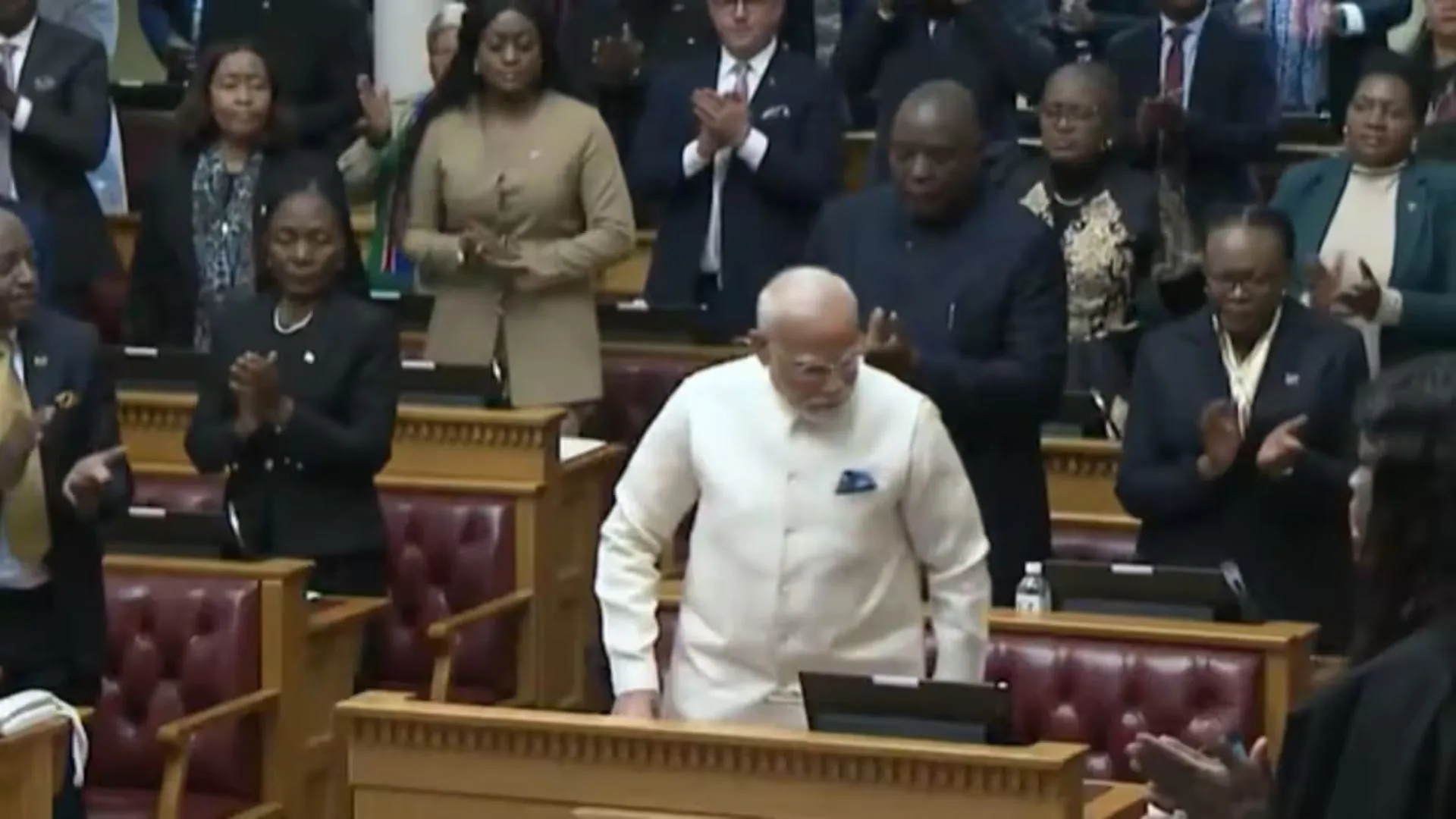Haryana’s Additional Chief Secretary of the Home Department, Dr Sumita Misra unveils her visionary blueprint for transforming governance and bolstering law and order. Renowned for her innovative leadership, she has spearheaded groundbreaking technological advancements, including AI-powered Dial 112 and widespread CCTV surveillance, redefining public safety and modernization. Tackling entrenched social issues like skewed sex ratios and child marriages, she champions holistic empowerment through education, stringent legal enforcement, and gender sensitization initiatives. Her trailblazing tenure in agriculture introduced bold reforms to curb stubble burning and advance sustainable farming practices. In an exclusive conversation with The Daily Guardian, the senior IAS officer, poet, and devoted mother and the frontrunner for the post of Haryana Chief Secretary, spoke over a length of issues including multifaceted strategies to combat drugs, cybercrime, and crimes against women. The excerpts
“As the Additional Chief Secretary, Home Department, of Haryana, how do you perceive this significant responsibility, and what are your key priorities to enhance law and order across the state?”
This role sits at the very heart of citizen-centric governance; without robust law and order, no other facet of development—social, economic, or institutional—can truly thrive. My key priorities are multi-faceted. Ensuring robust law and order is central to citizen-focused governance, and I am fully committed to this responsibility. Haryana’s police force is being modernized with AI-powered Dial 112 systems, enhanced jail security with 1,105 CCTV cameras, jammers, body cameras, and sniffer dogs. Civil Defence has been strengthened for quick emergency response, including livestock evacuation in disaster drills. Advanced forensics, cybercrime units, and predictive analytics are being introduced alongside better police training and equipment. Community policing is a priority to build trust and transparency. Specialized units target cybercrime, drug trafficking, and organized crime with zero tolerance, especially against drugs. Crimes against women and children receive top focus, with Fast Track Special Courts in Faridabad, Gurugram, and Panchkula under the POCSO Act. Haryana leads in implementing new victim-centric laws (BNS, BNSS, BSA) with statewide training. Plans for a National Forensic Sciences University campus and integrated digital systems further enhance safety, ensuring women feel protected and justice is swift.
“Given Haryana’s comprehensive strategy to combat the drug menace, particularly in border areas adjoining Punjab, what concrete steps are being taken to make these districts drug-free?”
To combat the drug menace, especially in border districts, the Haryana government under Chief Minister Nayab Singh Saini has launched a multi-pronged strategy combining enforcement, rehabilitation, and public engagement. A key initiative was the Drug-Free Haryana Cyclothon 2.0, flagged off in Sirsa and covering all 90 constituencies between April 5–27, 2025. The event saw participation from over 4.5 lakh cyclists and drew 7.2 lakh citizens in support of the anti-drug campaign. Haryana has registered 143 NDPS cases (Jan–Apr 2025), arresting 332 accused, including 145 inter-state smugglers, and seizing large quantities of narcotics. 143 cases of illegal drug-linked assets have been referred to the Enforcement Directorate, and eight Fast Track NDPS Courts have been set up in districts like Ambala, Sirsa, and Hisar. Rehabilitation efforts include 45 planned de-addiction centres, a 15-acre holistic rehab campus in Sirsa, and expanded training for medical officers. The MANAS helpline (1933) is now active statewide. Digital monitoring through systems like NCORD and NIDAAN, and community engagement via Prahari Clubs and viral campaigns like #NashaMuktJeevan and “Namak Lota Abhiyan”, are reinforcing awareness and grassroots participation. The government’s comprehensive approach combines inter-state coordination, law enforcement, health services, and public mobilisation, positioning Haryana as a model in the national fight against drugs.
Haryana has historically faced criticism over issues like skewed sex ratio, child marriages, and extra-judicial diktats against inter-caste and inter-faith marriages. How do you view these challenges, and what steps are being taken to promote genuine empowerment of women in the state?”
Haryana’s past struggles with issues like the skewed sex ratio, child marriages, and social diktats are undeniable, and they represent deeply entrenched societal challenges. I view these are not merely law and order concerns—they are deep-rooted societal challenges that obstruct citizen-centric development and genuine human progress. I view them as critical barriers to women’s empowerment, which demand a holistic, systemic response grounded in equity with efficiency. Our approach must be multi-pronged, addressing both the symptoms and the root causes.
Regarding the sex ratio, progress is being made, due to concerted efforts like the ‘BetiBachao, BetiPadhao’ campaign. Our focus is on stringent enforcement against illegal practices coupled with sustained awareness campaigns celebrating the girl child.
To combat child marriages and social diktats, we are strengthening legal frameworks and ensuring their rigorous implementation. However, true change comes through education and economic empowerment. We are investing in girls’ education, providing skill development opportunities for young women, and encouraging their participation in the workforce. When women are economically independent and educated, they gain agency and can make their own choices.
Furthermore, we are actively promoting gender sensitization at all levels – from schools to community leaders and even within the police force. Challenging regressive norms requires open dialogue and demonstrating positive role models. Our aim is to foster an environment where women feel safe, valued, and empowered to make their own life choices, ensuring they have access to justice and support systems when needed.
“During your tenure in the Agriculture Department, you introduced pioneering initiatives such as Direct Seeding of Rice (DSR), ‘MeraPani Meri Virasat’, and cash incentives to curb stubble burning. What inspired these reforms, and how do you see their long-term impact on sustainable agriculture in Haryana?”
During my tenure in the Agriculture Department, our focus was on sustainable, citizen-centric reforms to safeguard Haryana’s agrarian economy. Faced with depleting groundwater, stubble burning, and environmental challenges, we launched transformative initiatives like ‘Mera Pani Meri Virasat’, Direct Seeding of Rice (DSR), and cash incentives to curb stubble burning. The ‘Mera Pani Meri Virasat’ scheme encouraged farmers to shift from water-intensive paddy to less water-consuming crops. Haryana became the first state to incentivize DSR, offering Rs 4,000 per acre, which helped save up to 25% water. Stubble burning, a major pollution source, was tackled with cash incentives for sustainable management. The Supreme Court lauded Haryana’s model, which reduced fire incidents by over 80%, from 6,829 in 2021 to 1,315 in 2024. The Union Agriculture Ministry also recognized our efforts. In horticulture, we promoted modern techniques like vertical farming, polyhouses, and net houses. Landmark schemes such as the Mukhyamantri Bagwani Bima Yojana and Haryana Beekeeping Policy (2021-22) strengthened farmer incomes and sector resilience. These reforms reflect a shift toward resource efficiency, ecological balance, and farmer prosperity. By conserving water, improving air quality, and supporting innovation, we laid the foundation for a more resilient and future-ready agriculture sector.
“Haryana’s crèche policy—the first of its kind in India—was implemented under your leadership. What were the major challenges during its rollout, and how do you envision the future of such women-centric initiatives in the state?”
Haryana’s crèche policy, the first of its kind in India, aimed to help women balance professional and caregiving responsibilities—critical for inclusive growth. Key challenges included logistics, infrastructure, training caregivers, and changing mindsets to build trust among parents. Ensuring financial sustainability and scaling the initiative for wide coverage also required strategic planning. Despite these hurdles, the policy’s success reflects Haryana’s commitment to gender-responsive governance. The vision ahead includes expanding such women-centric initiatives, promoting flexible work options, enhancing skill development, and ensuring safety and dignity for women—empowering them to thrive without compromising family responsibilities.
“You are not only an accomplished IAS officer but also a poet and a mother. How do you manage to balance your creative passions with the demanding nature of high-level administrative responsibilities?”
It’s a question I get asked often, and honestly, it’s about finding those pockets of time and fiercely protecting them. My administrative responsibilities are, of course, paramount and demand my full attention and energy during the working hours. But I’ve found that creativity isn’t something you can just switch on and off; it’s a part of who I am. For me, poetry is a form of introspection, a way to process the world around me, and often, an escape. I write—both in English and Hindi. I’ve published five books of poetry, and writing has been a tremendous source of renewal, recharging, and emotional grounding amid the demands of work. I’ve learned to optimize my mornings, sometimes even getting up before dawn, or finding moments in the late evening, as I’ve penned in ‘Womanhood,’ where I find ‘an oasis of beauty in my frenetic day.’ Being a mother also teaches you incredible time management and prioritization. It’s about being present in each role when you’re in it, and understanding that each facet of your life enriches the others. My poetry gives me a certain equanimity that helps me navigate the pressures of administration, and conversely, my experiences in governance often provide rich material for my writing.” Achieving balance is something you have to consciously work towards. A work-life balance doesn’t just happen on its own; in fact, some days feel like even 24 hours aren’t enough.
“You’ve successfully led over 60 postings since 1991 and contributed to landmark initiatives. Among all these achievements, which one stands out as most meaningful to you–and why?”
That’s a very difficult question, as each posting, each initiative, has offered unique challenges and immense learning. However, if I had to choose two that resonate deeply, it would be my work in renewable energy, particularly during my tenure as Director of Renewable Energy in Haryana. We received three National Awards from the President of India for our work in 2007, and then three consecutive National Awards for Energy Conservation. This stands out because it felt like we were truly building something for the future – something sustainable and impactful on a grand scale, addressing both environmental concerns and energy security. The tangible results, the recognition from the President, and the sense of contributing to a greener future for Haryana were incredibly rewarding. It wasn’t just about policy; it was about bringing about a fundamental shift in how we power our lives, and seeing that vision come to fruition was immensely gratifying. We were awarded with ‘State Level Flagship Award” on “Atal Bihari Vajpayee SushasanDiwas” by the Hon’ble Chief Minister, Haryana for excellent performance in implementing the flagship Scheme “Meri FasalMeraByora” implemented by Agriculture & Farmers Welfare Department. We were awarded with ‘Agriculture Leadership Award-2021’ conferred to Horticulture in the year 2021-22 presented by Narender Singh Tomar. Union Agriculture Minister, Golorganised by India Today Media Group. Another ‘Best Horticulture State Award’ was awarded to Horticulture Department on dated November 12, 2021 presented by Union Minister of State for Food Processing Prahlad Singh Patel,
“With academic credentials from Harvard, Cambridge, and IIMs, along with a PhD in Economics, how have your educational experiences shaped your approach to policy making and governance in Haryana?”
“My diverse educational background has been foundational to my approach in public service. My PhD in Economics from Kurukshetra University provided me with a rigorous analytical framework – the ability to dissect complex problems, understand causal relationships, and evaluate the economic implications of policy decisions. This is crucial for developing sound, evidence-based policies, whether it’s in agriculture, transport, or social welfare.
Then, the exposure to institutions like Harvard’s Kennedy School, Cambridge, and IIM Ahmedabad was impactful. These programs weren’t just about theories; they were about global best practices in public policy, leadership, and management. They taught me about effective governance models, stakeholder engagement, and the critical importance of implementation. For instance, my role as Senior Advisor in the Economic Advisory Council to the Prime Minister, where I advised on subjects like ‘Circular Economy’ and ‘Blue Economy,’ directly leveraged my economics expertise and global policy understanding.
Collectively, these experiences have instilled in me a pragmatic, data-driven, yet human-centered approach to policymaking. They’ve taught me to look beyond immediate solutions, consider long-term impacts, and always strive for innovative yet sustainable solutions that truly benefit the citizens of Haryana.”
What advice would you give young women who aspire to take on leadership roles in public service today?”
My advice to young women aspiring to leadership roles in public service is threefold, build unshakeable self-confidence. Know your worth, trust your voice—even in male-dominated spaces. Leadership demands inner conviction and the courage to make tough decisions with a calculated, strategic mindset, embrace lifelong learning. Go beyond exams—stay informed, refine your skills in communication and planning, and focus on citizen-centric governance. For IAS aspirants, disciplined study is essential, but impactful leadership requires pragmatic thinking and a deep understanding of people’s needs. Build a strong support system. Seek mentors, collaborate with peers, and empower your team to innovate and lead from the grassroots.
You are widely seen as a leading contender for the post of Chief Secretary after the retirement of Anurag Rastogi next month. How do you feel about the possibility of Haryana appointing another woman to its top bureaucratic post next month?”
Haryana has a distinguished record of appointing women to the Chief Secretary position, the highest bureaucratic role in the state administration. However, it will be completely upto the wisdom of the Haryana Government. As rightly said in the Government we are bound to follow orders of the competent authority.





















